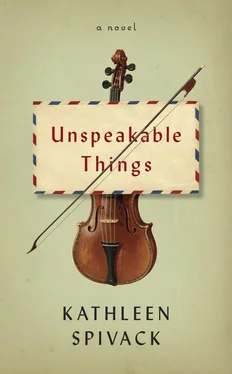So it was that he had heard the warning voices, figured out what was going to happen to them all much before it did. But no one would listen to him. Not for the longest time. They were all too busy dancing.
And what had Herbert had to pay to get them all out of Europe, a Europe in flames? Herbert had given: his house in Vienna, his garden, his wife’s jewels, the summerhouse by the seaside. He had given his bank accounts, all of them. His furniture, his large office on the top floor of the building that housed the Ministry, his library. He gave up his language; he gave up his wife’s sanity; he gave up his profession, and that of his older son, David, and his son’s wife, Ilse. Ilse, who could have safely stayed behind.
And finally, when there was nothing else left to give, he gave up his younger son, paying for their escape with sacrificial blood. The boy was laid on the altar of escape. (Bless me, bless me, oh Lord.) With one resolute motion, Herbert slit his second son’s throat. Michael thrashed against the doors of his own death, the boxcar carrying him away forever. Why, why? Adeline stared into Herbert’s eyes, the last look of comprehension flaring and then, horrified, dying forever. “Forgive me,” Herbert pleaded silently. The rest of the family was permitted to leave.
“Father, I forgive you!” But it was too late. Herbert paid.
In Vienna, the Tolstoi Quartet was becoming a nuisance. The Quartet had existed through generations since 1869, the date of the publication of Tolstoi’s great novel War and Peace, and it claimed a distant relationship to the Russian writer. Its musicians lived on money from the Tolstoi trust and from individual subscribers and patrons, and all this contributed to the growing suspicion on the part of the Austrian government, which had no financial control over them.
But they were Viennese to the core. They were as much a part of the tradition as four pillowed Sacher-Tortes set out on dainty plates with silver forks and doilies at the even more traditional Sacher Hotel. They were as innocent as mountains of whipped cream piled high on Viennese coffee. And inoffensive as Die Fledermaus, they still believed in happy endings.
Among their patrons was Herr Hofrat, the undersecretary at the Ministry of Trade. The Quartet performed often at the Hofrats’ house. And at the end of each performance, they always included a piano quintet so that their hostess, Frau Hofrat, Adeline, a former concert pianist and Herbert’s wife, could perform the final piece with them.
Already there was a mounting whiff of scandal around the undersecretary; it was said that he was perhaps embezzling funds from the exchequer, and the new government was secretly beginning an investigation that would trace the money to purchases of houses under false names. But the Quartet made it a point never to read a newspaper, never to go to a coffeehouse; they had never even heard the name Sigmund Freud. Music was their life.
Four single-minded men, they were swaddled in protective ignorance. With the help of their wives, they remained like little children who could do only one thing: play chamber music. In their spare time, they looked at musical scores and sang madrigals together. Every minute of the day was spent with one another. They practiced together in the same room with their instruments. They slept with their instruments. But since this group had also managed to marry, eventually this was to be the cause of their downfall.
Politics came and went in Austria, a geographical hub with shape-shifting borders that seemed to specialize in uprisings, assassinations, and operatic drama, but the Tolstoi Quartet stayed as it had always been. The Anschluss happened. The Quartet still gave their concerts. Musically, their repertoire was set; the quartets of Mozart and Haydn were their staples. Over the years, the Quartet had reluctantly added Schubert and then Brahms, and, most daringly, they had now moved on even to the late quartets of Beethoven.
They had always refused to play the newer composers, Mahler, Bruckner, and others. That refusal served to increase their popularity, for the times had caught up with them. The music of Mahler and others was now banned in the German-speaking countries and considered inflammatory and degenerate. The Tolstoi Quartet was praised for its unstinting support of what was truly pure-blood Germanic: its music. And for this reason, until now the Austrian officials had more or less left them alone.
All through Gustav Mahler’s tenure, from 1898 to 1907, when he was director of the Vienna Philharmonic Orchestra, and when his music was played everywhere, the ancestors of the present Quartet had remained faithful to the period when it had first begun, and in this way they felt they were not compromising the family money that had been set aside for them in a trust established by the Tolstoi family. Mahler’s music would never be stopped, however, not by new German borders: stateless, it wandered everywhere and took life from the sorrows of others, fastened itself like a vampire onto the mouths of grieving parents and the cries of little children.
In 1938, just before the Anschluss, Bruno Walter, né Schlesinger, traveled one last time to Vienna to conduct the orchestra. Then he left for good immediately after. Among the works Walter chose for this final program was the music of his former mentor. The orchestra played Gustav Mahler’s Ninth Symphony. This would not be heard again for a long time after. The Quartet did not attend that last concert. They continued to practice and perform their good old Mozart, the lighthearted thump-de-thump of Haydn and all the rest of their old chestnut repertoire.
By 1942, sixty members of the Vienna Orchestra had joined the Nazi Party, and two of these were members of the SS as well. That put the average membership in the Nazi Party among the orchestra at 48 percent, in comparison with the 10 percent Party membership among the Austrian population as a whole. Meanwhile, thirteen or more Jewish players from the orchestra had already been deported, some were murdered in Vienna, and a good number of them died in concentration camps. Half-Jews and those players who were married to Jews were winnowed out later.
Wilhelm Furtwängler was now appointed by Hitler as director of the Berlin Philharmonic during the Third Reich. He was based in Berlin but was responsible for all concerts throughout the new German territories. Furtwängler was highly ambivalent about this appointment, and he never joined the Nazi Party. But he was close to the leaders who set policy. He would be seen by history not only as a gifted and controversial conductor but as the Nazi darling, a traitor, or at least a double agent. He managed to save some of the doomed Jewish musicians, arranging for their escape. But equally randomly, he culled among their ranks, and under his directorship many more were sent to their deaths.
Furtwängler, who had been charged with resurrecting “true Germanic music,” was not in the habit of killing off his musicians directly. He covered his tracks. The notorious SS first trumpet player of the orchestra did the dirty work of denouncing the Jewish musicians in their midst, and those who were married to Jews. But Furtwängler kept a soft spot for the old classical players.
The members of the Tolstoi Quartet seemed not to notice anything going on outside of their practice rooms; they persisted as they had always done, keeping to themselves, playing their select concerts, going to the orchestra concerts, and they refused to comment. Timid and shortsighted, they closed their ears to many things.
The Quartet’s concerts were always sold out, and there were always long waiting lines to get in. Violent fights erupted outside the hall as last-minute concertgoers and students vied to get tickets. The police were getting a bit fed up with the fracas that went on whenever the Quartet gave a concert, but the men backstage inside the hall, preparing to perform, were not aware of the violence outside, violence that was becoming more and more overt.
Читать дальше












